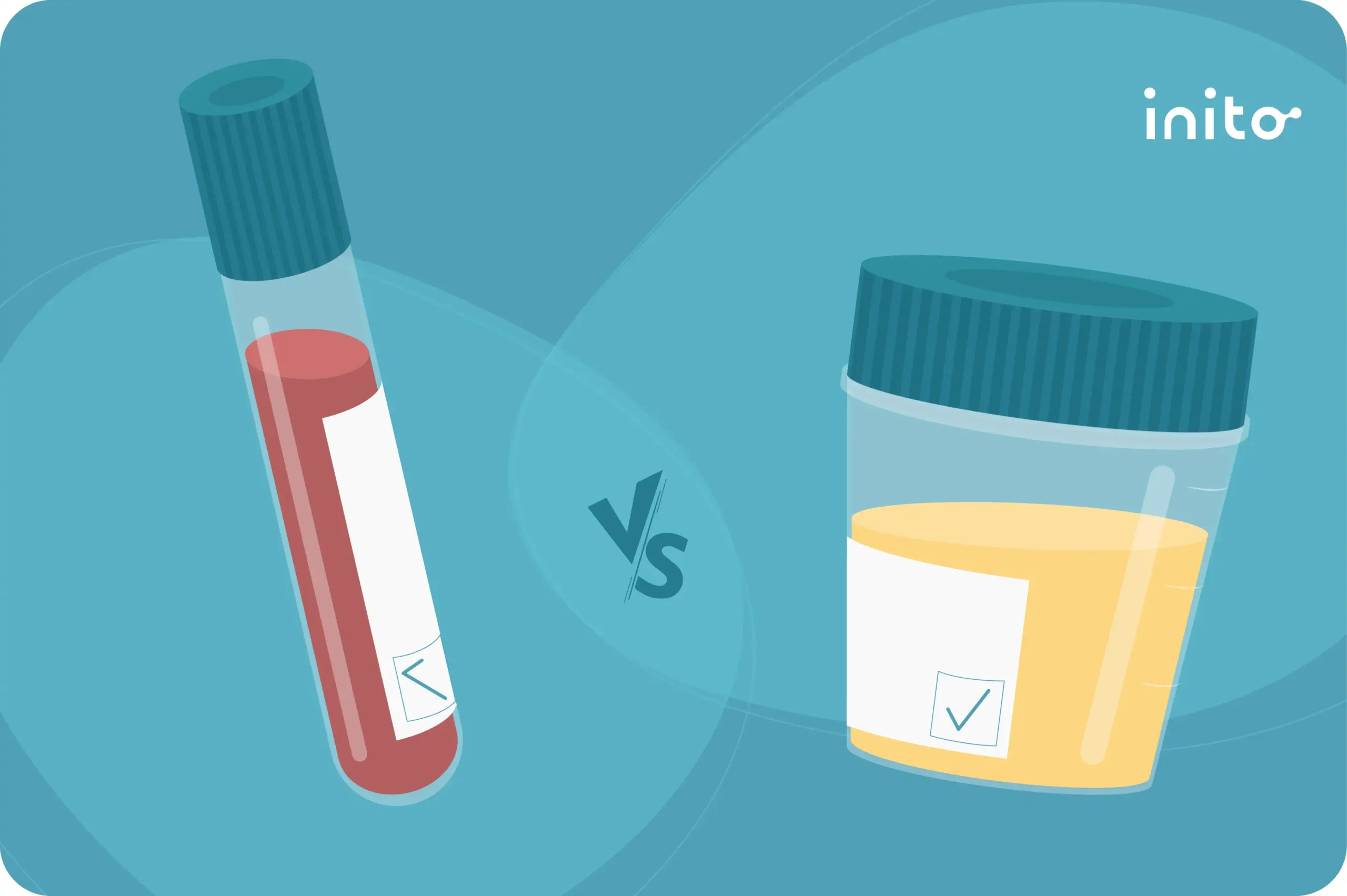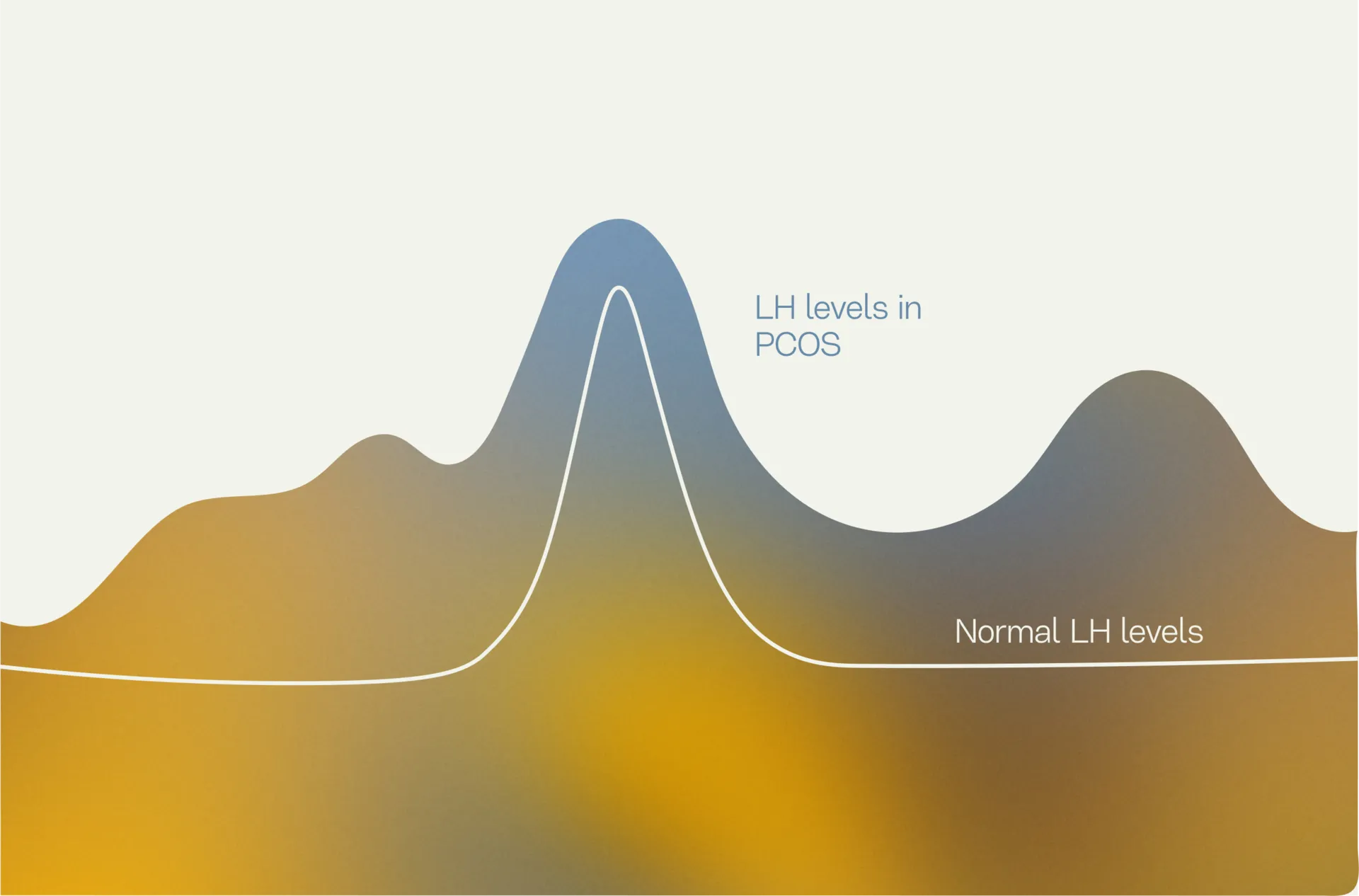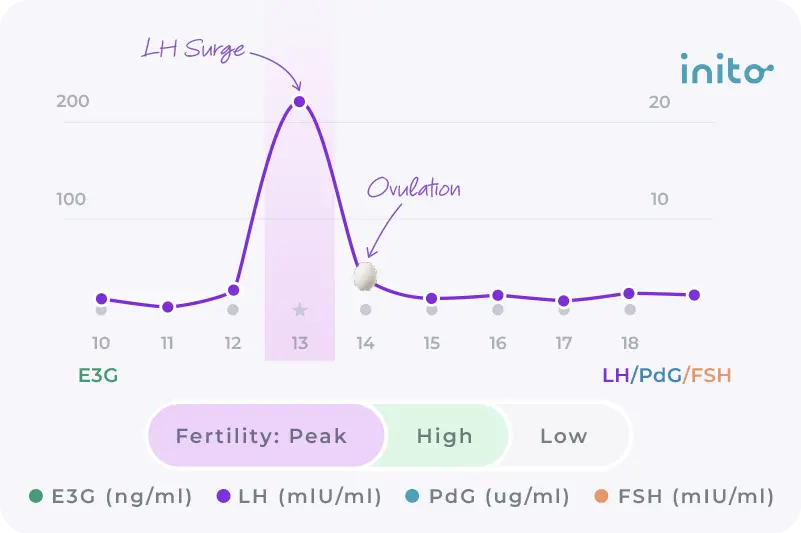Content table
When you think of testing your hormone values, you probably imagine driving to your local lab to get a blood draw. Cue the needle stick and pain.
But that is not the only way you can test your hormone values.
Urine tests can be used at a lab or from the comfort of your home to measure your hormone levels.
Would they be the same? Well, no! Your blood and urine levels will never be the same. Blood tests measure the hormones circulating in your bloodstream. Urine tests reflect your hormone values that have been metabolized and excreted out of your body.
For instance, serum progesterone is measured as ng/mL, while progesterone metabolite (PdG) is measured as ug/mL. Although the values are different, your blood and urine levels are correlated.
Blood and urine tests both have their uses. So how do you know which is best for you?
To help answer that question, we are going to look at the differences and similarities between blood and urine testing.
Key takeaways
- Hormones can be measured via a blood test or urine test. Blood and urine values will not be identical because they are in different mediums, but they both accurately reflect hormone levels.
- Urine testing is convenient, cheaper, pain-free, and accurate enough.
- Blood tests are uncomfortable and cannot be done in the comfort of your home.
- Urine testing is accurate but can be affected by liver and kidney function. Other factors such as diet, hydration, exercise, and medication can alter accuracy.
- Try urine testing first as there is a low barrier to entry. If you then think you have altered results, talk to your doctor about getting a blood test.
What is the difference between blood and urine values?
Blood tests are when your hormones are measured in blood by drawing blood from your body. Urine tests involve you peeing in a cup and a test strip being used to measure the hormone values in their metabolite form.
Which test is more accurate - blood or urine?
Blood tests are the gold standard for measuring your hormone values. However, studies show that urine values correlate to blood values very efficiently.
So, you can interchange your testing style whenever you feel the need to get yourself tested. If you wish to track your fertility hormones in urine to identify your fertile window and confirm ovulation, you could use the Inito Fertility Monitor.
Studies show that Inito is 96% accurate as compared to blood tests in confirming ovulation.
Now you might be wondering how hormones end up in your urine to begin with. To understand that we first need to look at how hormones are metabolized.
How do hormones travel from the blood to your urine?
Think of hormone production and metabolization as a 6 step process. Let’s break down each step.
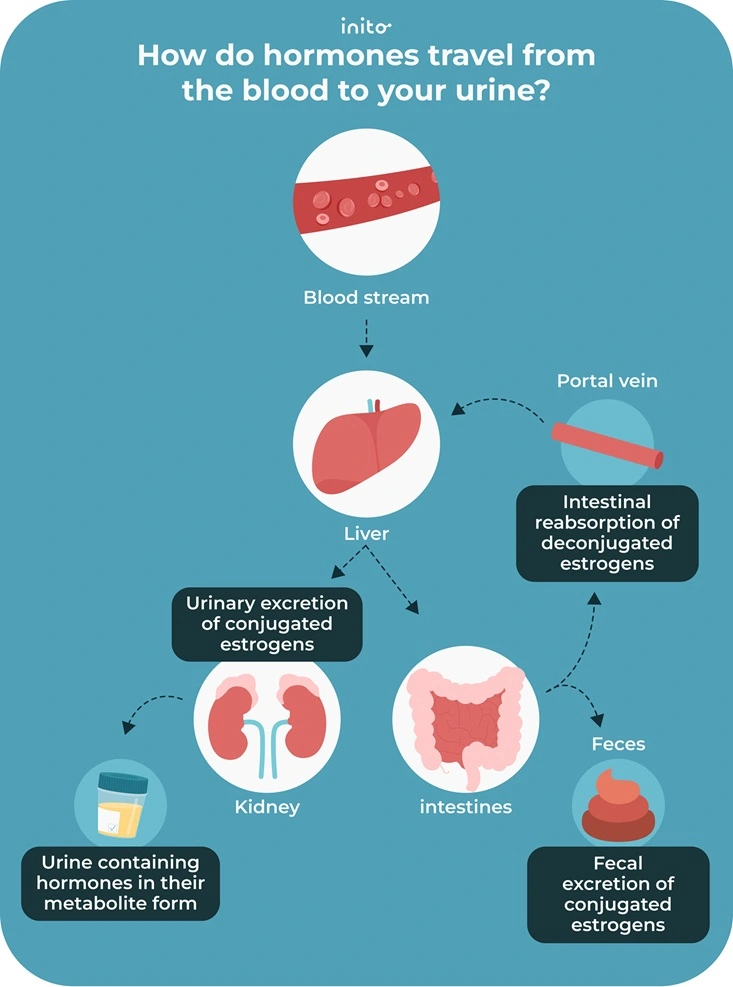
1. Hormone production
Fertility hormones are produced by various glands in the body. Here are a few examples:
Estrogen is primarily produced by the ovaries.
Progesterone is produced by the corpus luteum.
Luteinizing hormone (LH) and follicle stimulating hormone (FSH) are secreted by the pituitary gland.
2. Circulation
Once each hormone is produced, they are released into the bloodstream to circulate throughout the body. From here they can exert their effects on various tissues and organs.
For example, when LH reaches a certain level it triggers your ovaries to release an egg, which is called ovulation.
Know more: LH Surge: When do You Ovulate After an LH Surge?
3. Liver metabolism
The liver must metabolize hormones before they can be eliminated through the urine. The liver processes hormones to make them more water-soluble and less active. This metabolization by the liver plays an important role in maintaining healthy hormone levels.
4. Kidney filtration
Now that the hormones have been metabolized, the kidneys can successfully filter them out of the bloodstream.
Similar to the liver, the kidneys play an important role in regulating hormone levels.
5. Urine formation
Urine is formed in the kidneys and is made of metabolized hormones, waste products, and excess water.
6. Excretion
From the kidneys, urine travels through the ureters, into the bladder, and out of the urethra.
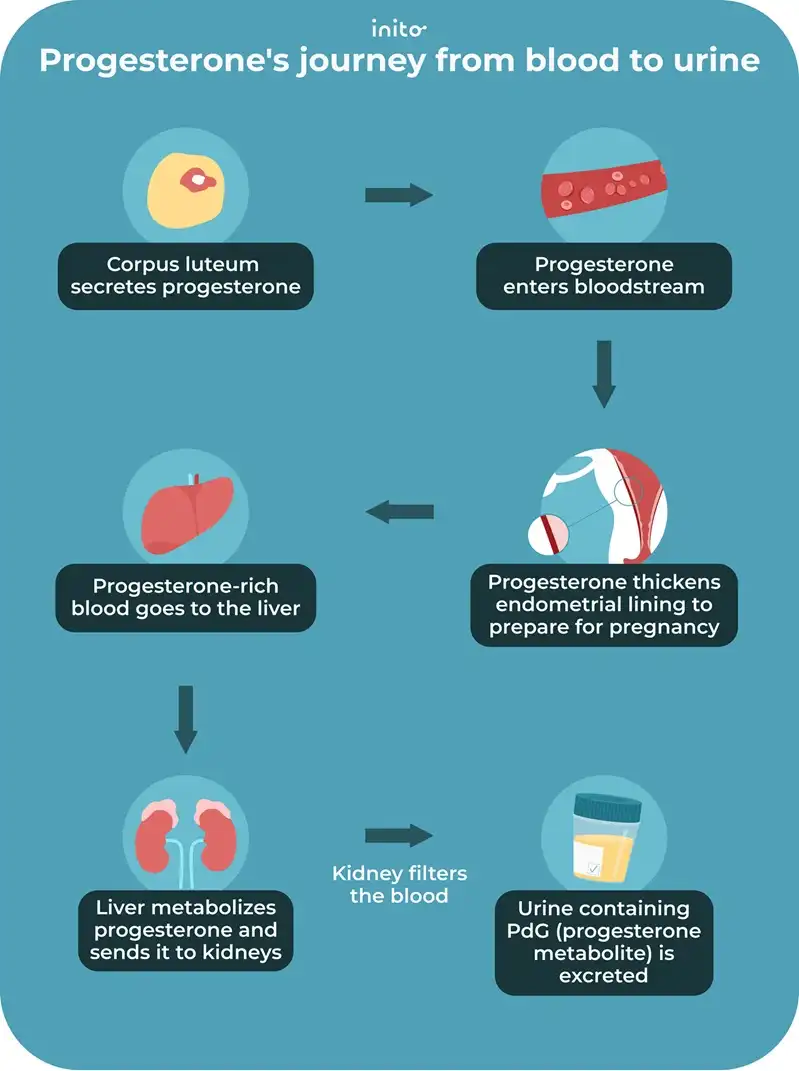
To illustrate this process, let’s look at progesterone’s journey in the body.
The corpus luteum secretes progesterone after ovulation. Progesterone enters the bloodstream and circulates throughout the body to exert its many effects.
For example, one function of progesterone is to thicken the endometrium lining to prepare the body for pregnancy.
From here, the progesterone-rich blood is processed by the liver. Progesterone is metabolized in preparation to be excreted from the body. The kidneys filter the blood (which contains metabolized progesterone) and urine is formed. The final step involves the excretion of urine, which contains PdG – the urine metabolite of progesterone from the body.
Read more: Progesterone vs. PdG Test: Is There a Difference?
A urine and blood test can both be used to measure hormone levels even though they are technically testing for different compounds. What does science say about how their values relate to each other?
What’s the correlation between blood and urine hormone levels?
A blood test measures the amount of free and total hormones in the serum. A urine test measures the amount of metabolized hormone.
Although they are two different compounds, the results still correlate. Studies have shown there is “excellent agreement” between blood and urine levels of LH, estrogen, and progesterone.
Take a look at these graphs from a study that compared blood and urine levels of LH, estrogen, and progesterone.
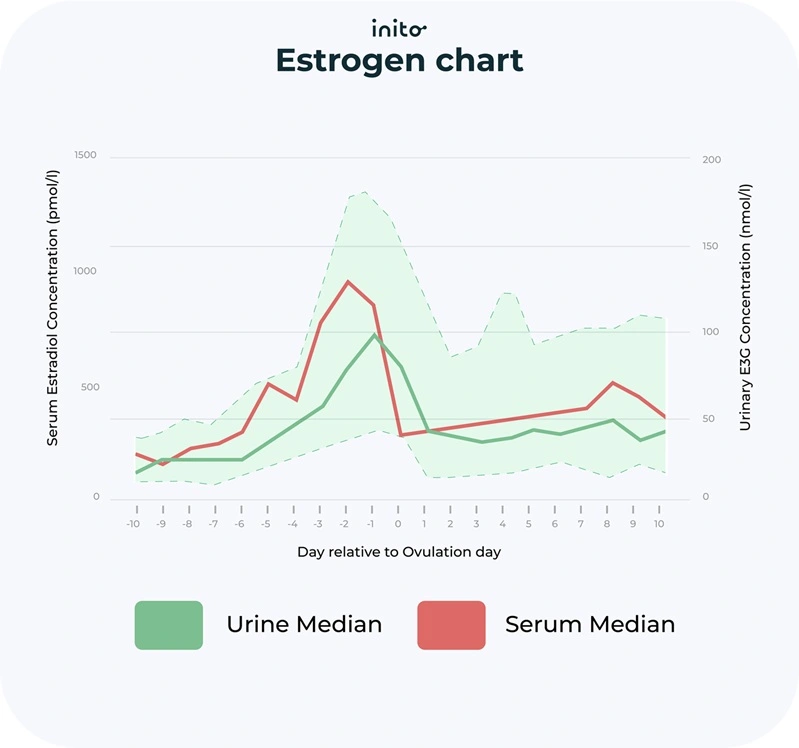
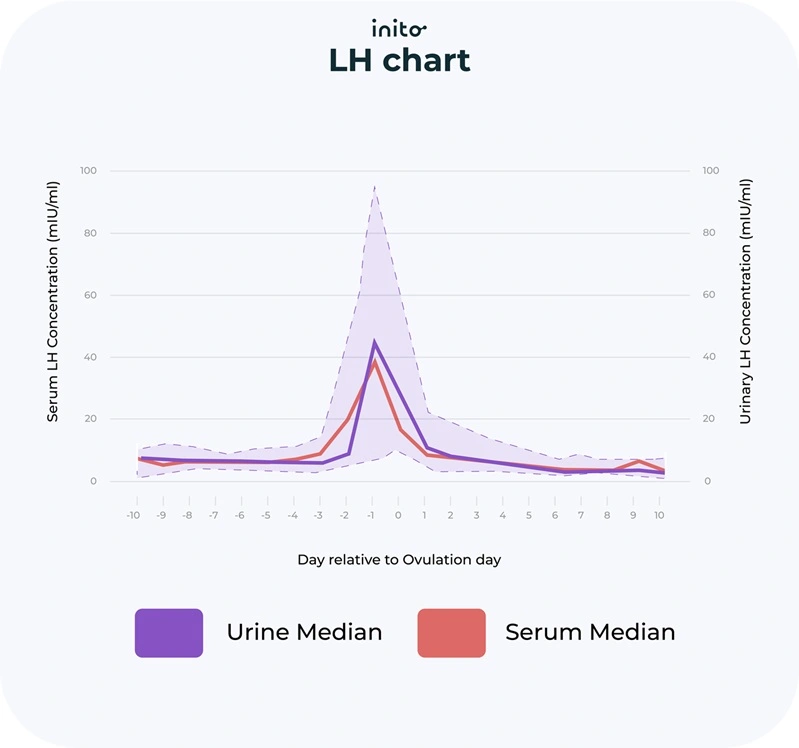
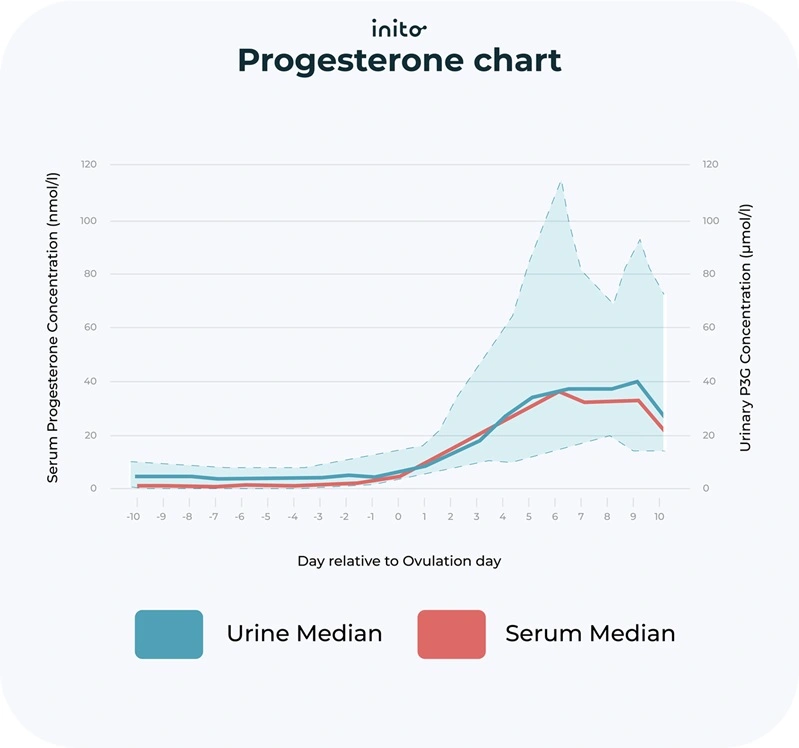
You can see that the blood and urine levels rose and fell at a similar rate.
Some situations may cause misalignment between blood and urine levels. This most often occurs when a condition affects the concentration of hormones in the urine.
What factors affect the concentration of hormones in urine?
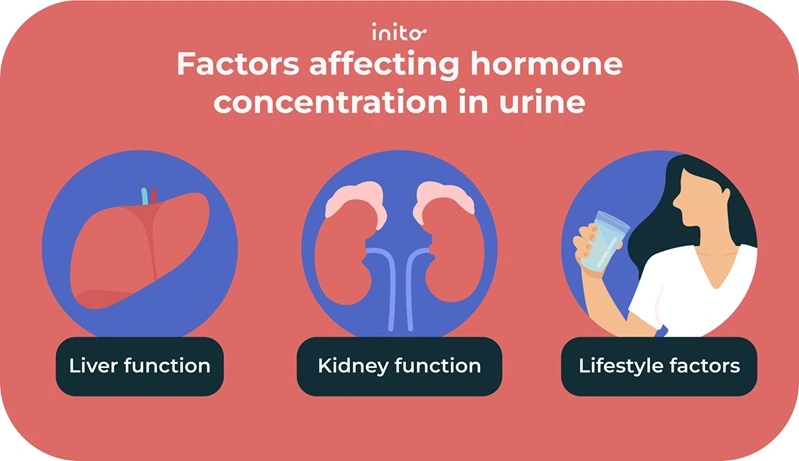
The liver and kidney play an important role in processing hormones. A problem with either of these organs will affect the concentration of hormones in the urine.
Liver function
Urine hormone values will not accurately represent the true hormone value in blood but would be similar in trends to the blood values.
Kidney function
If you have a liver or kidney condition, urine tests may not be the right choice for you.
Lifestyle factors
There are lifestyle factors that can affect urine concentration such as the following:
- Hydration status
- Diet
- Exercise
- Medications
What are the advantages of urine hormone testing?
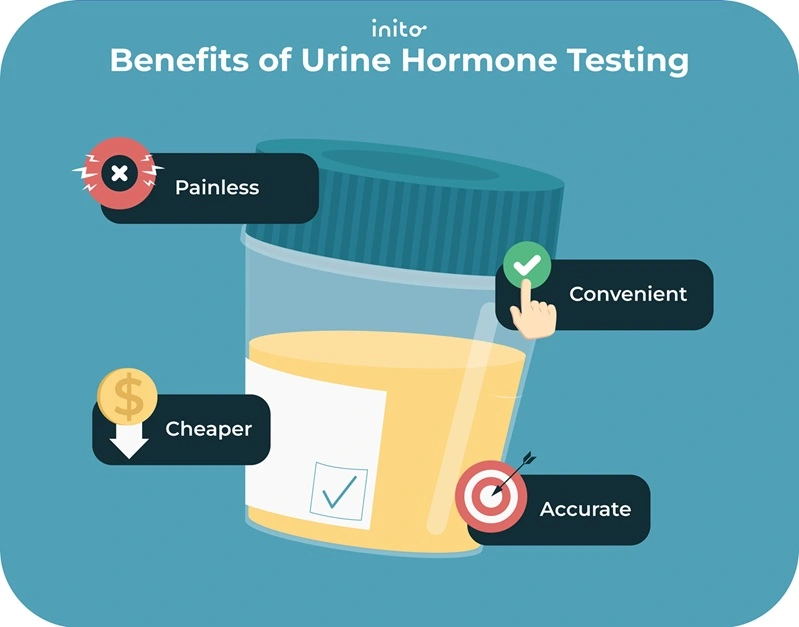
Urine hormone testing can give you an accurate representation of your hormone values.
And there are many other advantages. The following are a few of the advantages of urine hormone testing.
Accuracy
While blood tests are considered the gold standard for getting your hormone values checked, urine tests are equally accurate if not more.
Studies show that urine values correlate effectively to blood values in accuracy and may be used interchangeably.
Since progesterone is released in pulses in the body, there are fluctuations in the levels within minutes. Research has shown that progesterone levels range between 7 nmol/l to 128 nmol/l within minutes during a 24-hour study period.
A fertility monitor like Inito is 96% accurate as compared to blood tests in confirming ovulation.
Convenient
At-home urine tests can be done daily or multiple times a day. From the comfort of your home!
You can’t do that with a blood test. You have to book an appointment, sometimes weeks in advance to get a blood hormone test.
With urine testing, you’ll be able to measure your hormone fluctuations more easily. You can track how your hormones change over the day, week, and month.
The Inito Fertility Monitor specifically provides you with personalized hormone charts. You can conveniently access the charts on the Inito app. When you get a blood test, you won’t get personalized charts. With Inito, you can get a full picture of your cycle by testing daily.
Read more: Day 21 Progesterone Testing: Everything You Must Know
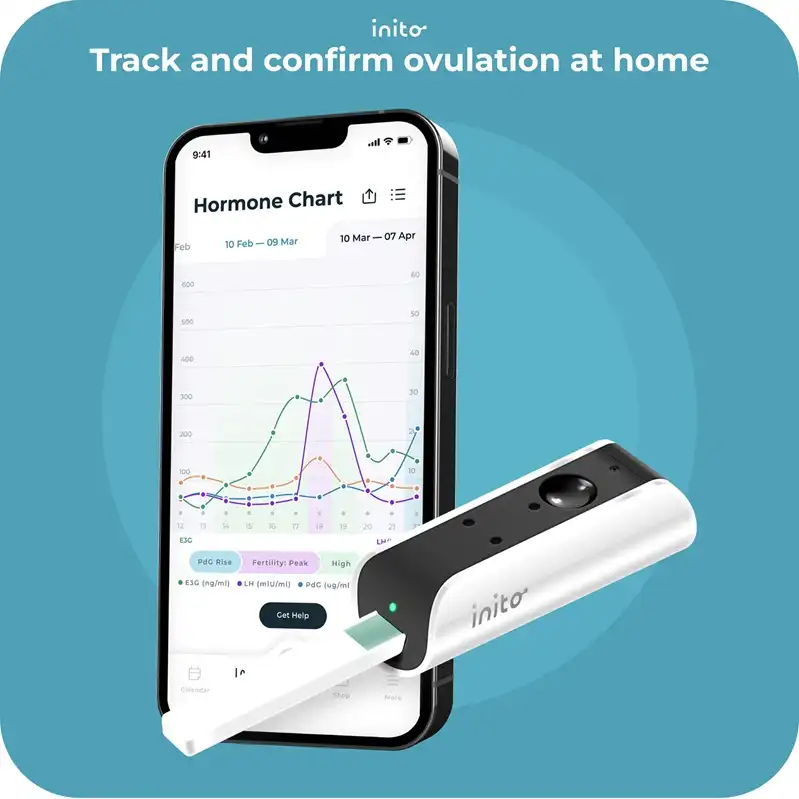
Cheaper
The cost of a hormone blood test can vary depending on the hormones that are measured. But you’re looking at around $50-$200 per test. This means you would be spending over thousands if you were to test daily throughout your cycle. And insurance may not cover everything.
A comprehensive hormone profile may cost several hundred dollars or more.
Over-the-counter ovulation predictor kits (OPKs) are usually quite affordable. And they can be purchased without a prescription. Basic kits may cost around $30. However, they don’t give you actual values and you would have to rely on your eyes alone to decipher the test lines.
Know more: How Accurate Are Ovulation Tests?
An advanced kit, such as the Inito Fertility Monitor, costs $149 for a 15-day supply. Which is a fraction of the cost of blood tests. And to top it, Inito is also HSA/FSA eligible. Talk about saving some money, girlies!
Painless
Peeing into a cup is easy-peasy-lemon-squeezy. No needles and no pain.
Inito Fertility Monitor can measure all four fertility hormones in urine. But how is it different from the regular OPKs?
Inito vs OPKs
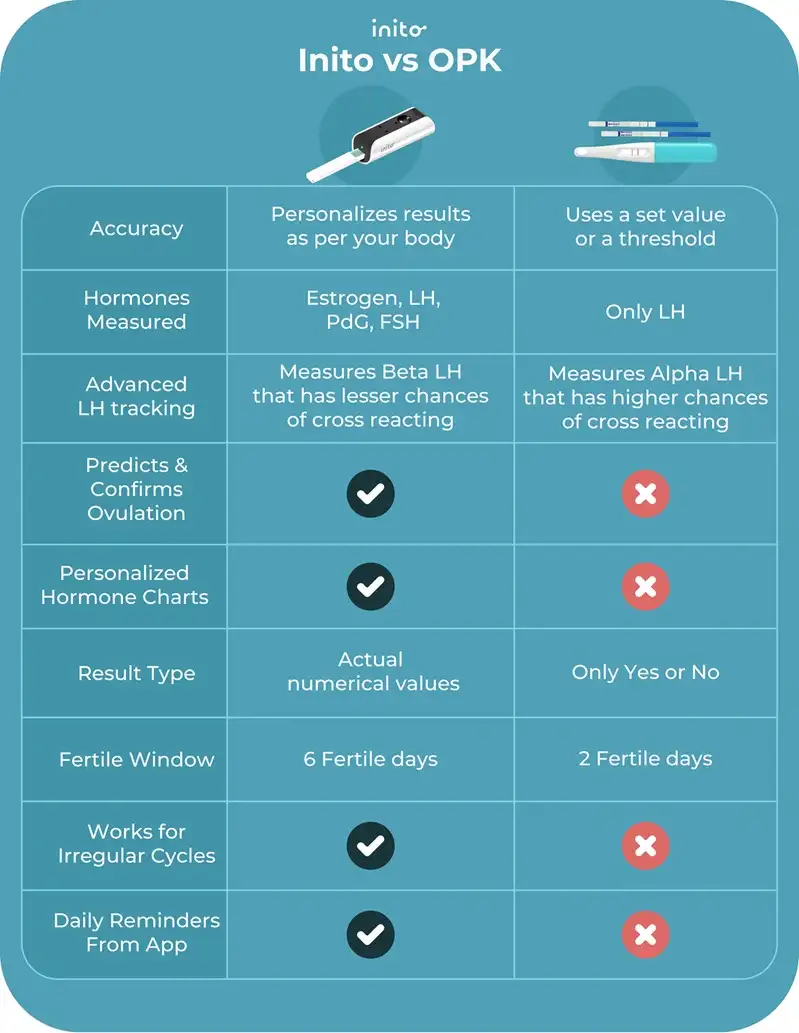
How does the Inito Fertility Monitor compare to traditional OPKs? Is one more accurate than the other?
OPKs
You may find traditional OPKs are accurate if you meet the following criteria:
- You have regular 28-day cycles. However, only 13% of women have a 28-day cycle. If your cycle is shorter, longer, or irregular, you may get inaccurate results with an OPK.
- Your LH levels fall in the average threshold range. Most OPKs will give a positive result if your LH is around 25-40 mIU/mL. However, your LH levels could be as low as 6.5 mIU/mL and still trigger ovulation.
- You use the OPK correctly. There is plenty of room for user error with OPKs. If you miss a step or do something incorrectly, your results won’t be accurate.
Even if you do meet the above criteria, OPKs can only predict ovulation. They cannot confirm it.
Know more: How to Read a Positive Ovulation Test?
Inito
The Inito Fertility Monitor does not require you to meet certain criteria.
- You can use Inito despite having short, long, or irregular cycles.
- Your hormone values don’t have to be within the average threshold values.
- A single test strip measures LH, estrogen, PdG (urine metabolite of progesterone), and FSH. And all the information is uploaded to an easy-to-use app.

FAQs
Your urine and blood levels will not be the same. Blood tests measure the amount of free hormone in the serum. Urine tests measure the amount of hormone metabolite in the urine. For instance, serum progesterone is measured as ng/mL, while PdG – urine metabolite of progesterone is measured as ug/mL. Although the values are different, your blood and urine levels are correlated.
The same hormone is measured in the urine and blood. But the urine test measures the metabolized version of the hormone. For instance, a blood test will measure your progesterone levels. A urine test will measure PdG, which is a progesterone metabolite.
The numerical value is different between blood and urine tests. This means your urine hormone levels may not be as high as your blood levels. However, they should still correlate unless there is an underlying condition that is altering the results of your urine hormone levels. For instance, if your urine is diluted, the concentration of your hormone levels will be lower. This is why it is often recommended to use your first-morning urine for a urine test.
The hormone level in blood is a value of the hormone present at the moment. Whereas the hormone in urine is a metabolite form of the hormone excreted via urine after a urine-hold of a few hours.
No, there is no direct conversion factor or formula to correlate blood and urine values. You would always observe a similar trend in urine and blood values but would not get the same values on both since the media of testing are different.
Urine and blood tests are both accurate. Studies show a strong correlation between your blood and urine hormone levels. You can rely on urine tests to detect your hormone levels on days when you are unable to get a blood test done.
Urine tests can be influenced by factors such as liver and kidney function, diet, exercise, hydration status, and medications. However, to get accurate and uniform results, it is recommended that you collect urine for testing after a 6-hour urine hold or preferably use your first morning urine for testing.
Both blood and urine testing have their own pros when it comes to getting tested. If you want a painfree, cheaper, convenient option to get tested while also getting accurate results, you may opt for urine testing.
Was this article helpful?
- Urinary Luteinizing Hormone Tests: Which Concentration Threshold Best Predicts Ovulation?
- Validation of urinary reproductive hormone measurements using a novel smartphone connected reader | Scientific Reports
- Full article: Monitoring the menstrual cycle: Comparison of urinary and serum reproductive hormones referenced to true ovulation
- Predicting serum hormone concentration by estimation of urinary hormones through a home-use device – PMC
- Monitoring the menstrual cycle: Comparison of urinary and serum reproductive hormones referenced to true ovulation
- Real-world menstrual cycle characteristics of more than 600,000 menstrual cycles | npj Digital Medicine



